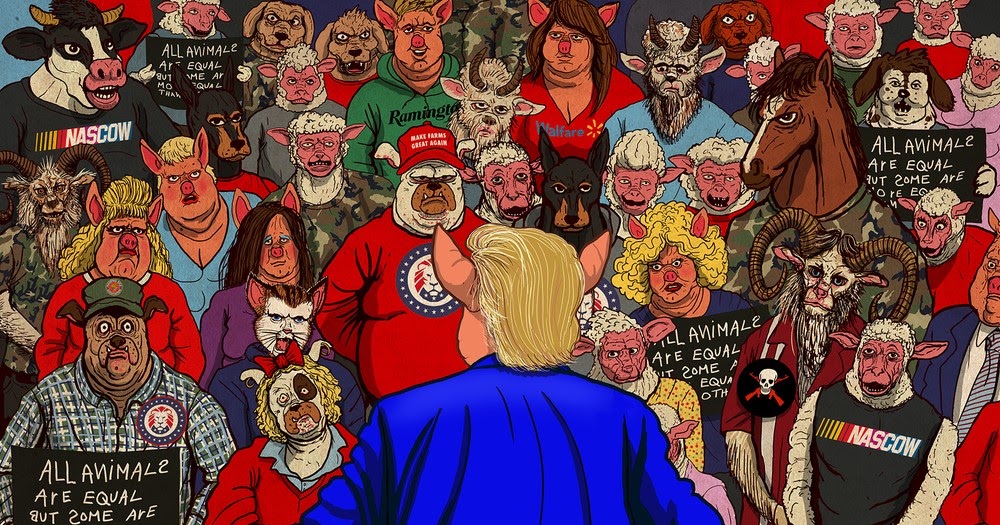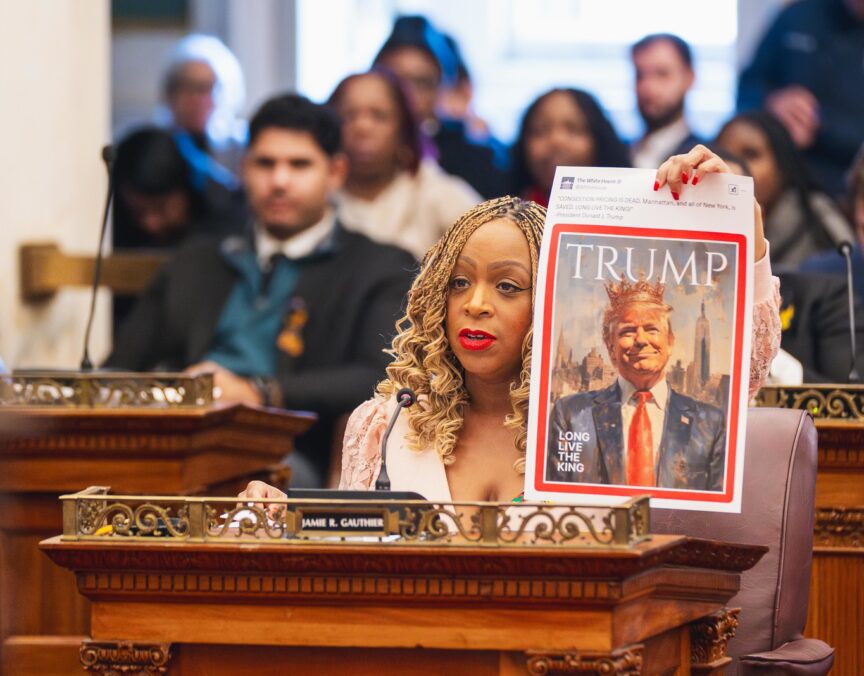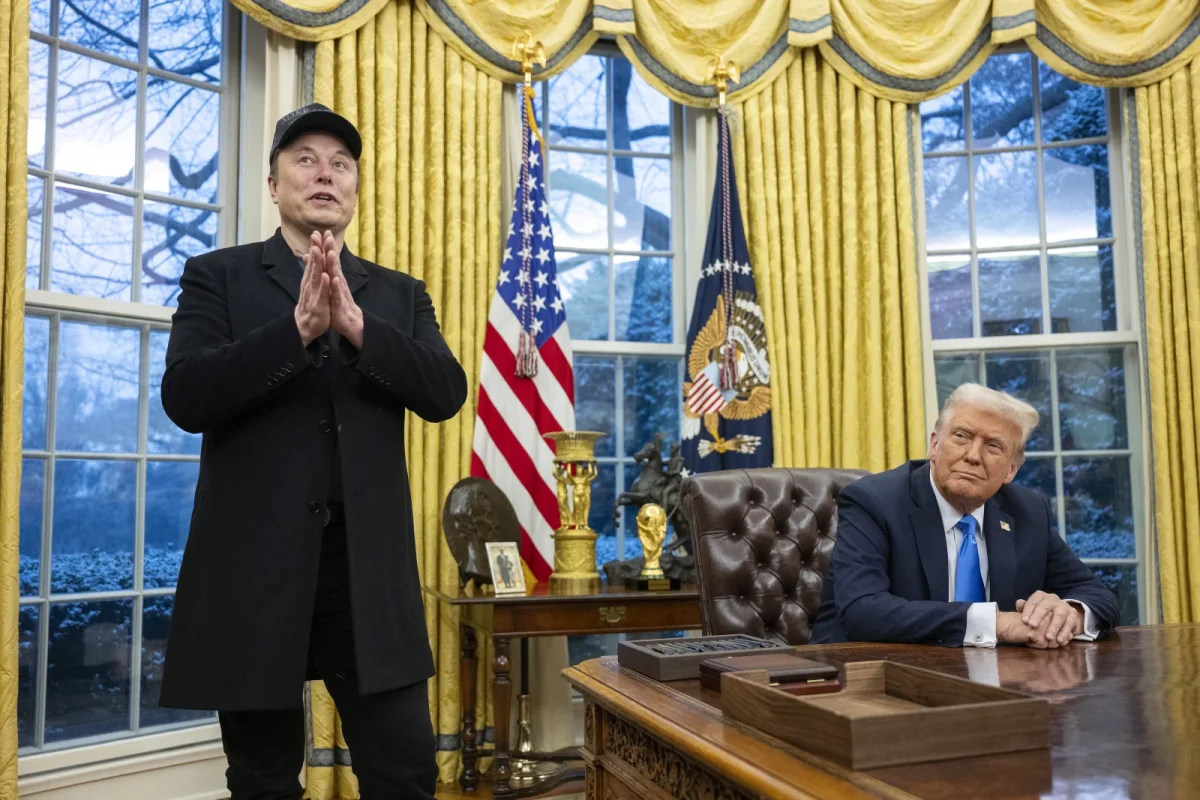George Orwell is one of the most prolific writers of all time for a reason; he writes about what matters and writes well. After reading “Animal Farm,” one of Orwell’s well-known books, I was shocked by how many similarities I found between the main villain, Napoleon, a dictatorial pig, and President Donald Trump.
“When I sit down to write a book, I do not say to myself: ‘I am going to produce a work of art.’ I write because there is some lie I want to expose, some fact to which I want to draw attention,” Orwell said.
For those who are not familiar, “Animal Farm” is a less than 100-page book that follows a group of animals who stage a rebellion against humanity in hopes of creating a utopian society based on complete equality. However, the pigs, led by Napoleon, quickly seize power and twist every promise of prosperity into a tool of propagandizing and manipulating oppression.
Though Orwell wrote this classic with the 1917 Russian Revolution and Joseph Stalin’s rise to power at the forefront of his mind, its disturbing warning message provides the perfect allegory for concerning political decisions currently being carried out by the Trump Administration.
There are parallels in the contradictory statements, unwarranted self-glorification and the false placement of credit where credit is entirely undue that appear both under Napoleon’s regime and within the Trump administration.
Early in the book, Napoleon argued against the building of a mill for the animals. However, once he chased away his political opponent, he took credit for the idea of the mill and insisted that the animals start building it. Orwell says, “…the animals were somewhat surprised to hear Napoleon announce that the windmill was to be built after all. He did not give any reasons for having changed his mind…”
Similarly, Trump is known to contradict himself often. In his first term, Trump championed police support, yet at the start of his second term, he pardoned the rioters from the insurrection attempt that took place on Jan. 6, 2021 — the same rioters who assaulted, injured and killed multiple Capitol police officers. Furthermore, after the attack, Trump refused to lower flags to honor the police officers who protected the Capitol with their lives.
In “Animal Farm,” Napoleon did none of the work, then took credit for all achievements completed by the farm animals. Trump has often taken credit for policies initiated by former President Barack Obama. Trump repeatedly claimed that “we took care of the vets, 91% approval rating.” This figure was actually from a 2013 survey taken during Obama’s presidency, while a 2019 VFW survey shows that only 82% satisfaction existed for veterans in the VA.
Furthermore, Trump stated roughly 217 times that “Our beautiful vets, they were very badly treated before we came along. And, as you know, we get them great service and we pick up the bill, and they can go out and they can see a doctor if they have to wait long periods of time.” This quote references the Veterans Choice and Accountability Act, which was signed into law by Obama. This act allowed veterans to seek cost-covered private medical care if VA wait times exceed a certain period
I have often heard Trump supporters echo false claims made by Trump, which reflects a similar mindset held by the uneducated, successfully propagandized farm animals in “Animal Farm.”
“It had become usual to give Napoleon the credit for every successful achievement and every stroke of good fortune. You would often hear one hen remark to another, ‘Under the guidance of our Leader, Comrade Napoleon, I have laid five eggs in six days,’” Orwell said.
False notions must have a source, and, in our modern world, they often come from the mouth of the president himself.
Trump repeatedly claims credit for achievements that are not his. The Washington Post reported that Trump repeatedly boasted 493 times that “we also built the greatest economy in the history of the world,” despite the fact that there was more economic growth under former Presidents Dwight Eisenhower, Lyndon B. Johnson and Bill Clinton. He also insisted 296 times that his tax cuts are the largest in U.S. history, even though former President Ronald Reagan’s 1980 tax cuts were 2.9% of the gross domestic product (GDP) and Trump’s amounted to 0.9%, making his the eighth largest in 100 years.
Often, I find myself alarmed by the bipartisan lines that seem to be drawn through every layer of our current society. I feel a chasm of division open between the political parties. I find it difficult to hold conversations with those who are staunch Trump supporters, for though I have no qualms with the values or ideals of the Republican Party, I am extremely disturbed by the cultish deviation from traditional conservative values that Trump has led the Republican Party through.
He has led them to believe and support political decisions that I truly believe would resurrect Reagan from his grave. Reagan, a popular Republican president, was in favor of free trade and hated Russia, meanwhile, Trump Republicans support tariff wars and Trump is friends with controversial Russian president Vladimir Putin.
In “Animal Farm,” Napoleon’s education of the less-than-competent group of sheep on the farm is frightening. The sheep could not memorize the commandments written on the barn wall, but they knew “four legs good, two legs bad,” which they would bleat at random. This simple refrain, often said by the sheep, drowned out any more nuanced opposition or debate to Napoleon’s rules.
Furthermore, at the end of the book, Napoleon trained the sheep to say, “four legs good, two legs better,” for Napoleon learned to walk on two legs and taught the sheep as well. The lack of understanding and education that the sheep possessed made them all too happy to discard their former saying of “four legs good, two legs bad” to “four legs good, two legs better,” simply because that is what their leader told them to do.
Similarly, Trump’s direct, crude and to-the-point language often resonates with many of his less educated followers, for it is easy to remember and repeat. His supporters — who feel alienated from the language of the college-educated, pretentious elites — cling to his catchphrases without question, even when the stances change, much like the blindly loyal sheep on the animal farm.
This mirrors the cognitive dissonance, or the discomfort one experiences when they hold contradictory beliefs, occurring in our society. Now, contradictory beliefs are at play at every level of political discourse. Cognitive dissonance is the idea that, to avoid discomfort, we will switch or defend our positions entirely, even if shown new information that proves them false. We label any new information that dares to change our beliefs as fake or misleading news. In doing so, we isolate ourselves from the chance of absorbing new, important information that could prove to be true because we would rather die on our separate hills than expand our understanding.
In “Animal Farm,” the sheep switch their simple chant because their leader, Napoleon, told them to do so. They switch their entire belief system to align with the changed view of the ladder. Today, we see Trump supporters cheer for policies riddled with contradictions and falsities simply because they fit their partisan worldview. Whether it is the Trump administration’s contradictory policies or the unyielding support of Trump’s devoted followers, cognitive dissonance is a recipe for societal division.
We, like the farm animals, live in a society where confirmation bias rules, a society where facts are bent until they resemble the unrecognizable. We live in a society that Orwell cautioned us about almost 80 years ago.
Orwell’s “Animal Farm” is not just a story about farm animals — it is a warning about what happens when the truth is sacrificed and one person is allowed to gain complete power. Napoleon and Trump are certainly not identical. However, there are many parallels. Their underlying tactics are uncomfortably similar and should be cause for concern. With both, we see a leader who manipulates language, takes credit for the work of others and rallies the uneducated masses while fostering fear and division to remain in power.
Orwell writes not to create art but to expose lies. His 1945 masterpiece, “Animal Farm,” is a testament to the power of truth — a truth that remains incredibly relevant in today’s world. Comparing Napoleon, a character based on Stalin, to Trump sheds light on the dangers of unchallenged, unchecked power and the ease with which messaging and language can be used to control the masses.
Through Orwell’s allegory and our modern, political reality, the manipulation of language, constant contradictions and blind repetition of falsities are all part of a dangerous slip-n-slide into fascism that we, as a people, must fight at all costs.










